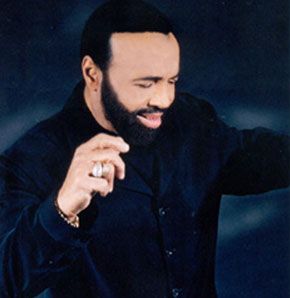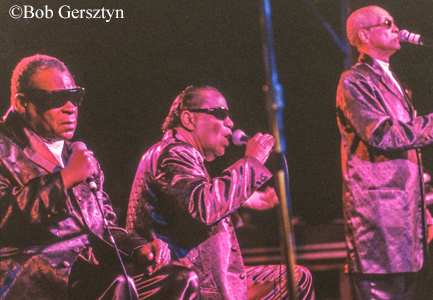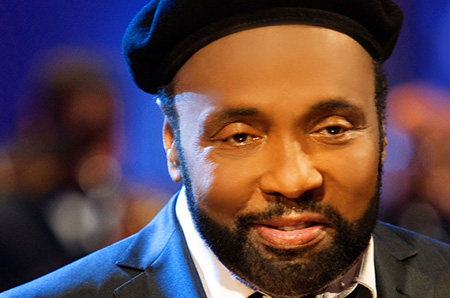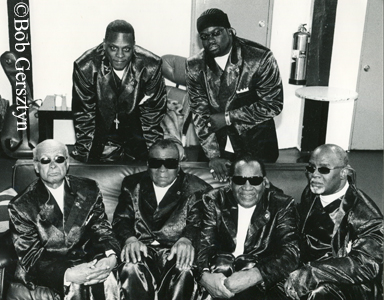Black Gospel Music
 |
 |
| Andrae Crouch, Blind Boys of Alabama | |
A Brief History
By Bob Gersztyn
(April 2022)
The roots of Black Gospel music goes back to the pre-antebellum period that existed in the South, especially Georgia in the mid 1700's. Robert Darden's 2004 edition of People Get Ready! A New History of Black Gospel Music explains how the African slaves who were cut off from their religious traditions and sources of mythology adopted new ones. They combined their native religion with what they learned from the Bible and gave birth to their own version of 1st century Christianity. The spirituals were developed through hours of practice during back breaking work as field hollers and the finished product was then polished and presented in their clandestine spiritual meeting places in the hidden groves where the mystical "ring shout" was performed.
The grove meetings with their "ring shout" were clandestine religious services that the slaves conducted secretly that allowed the development of the songs that they sang to evolve into what became known as the "spirituals" or "Black Sacred Music." At the same time, the songs became a coded language that allowed the slave population to communicate with each other using the field hollers with coded words and messages. This gave birth to songs like "Follow de Drinkin' Gou'd," "I'm Troubled in Mind" and "Swing Low Sweet Chariot" used by the Underground Railroad.
After the Civil War and during Reconstruction the spirituals were performed for White audiences across America and in Europe by the Jubilee Singers and Minstrelsy. Minstrelsy was represented by both Black & White performers and it became the first time that Black music was appreciated on a large scale by White audiences. Minstrelsy evolved into barbershop quartets originally performed by all black singers and the spirituals evolved into gospel.
By the beginning of the 20th century, the quartet format was adopted by white performers and gospel influenced blues and jazz, and later R&B. Once recording and distribution were perfected along with radio transmission, the speed of the dissemination of music increased exponentially. It was the dawn of the recording industry and the new technology was available to anyone. Recordings by early 20th century gospel artists like Thomas Dorsey, Sallie Martin and the Golden Gate Quartet paved the way for the "Golden Age of Black Gospel Music" that began in the 1940's and lasted for 2 decades. One of the early classic Black gospel groups that emerged in the late 1930's was the Blind Boys of Alabama.
In 1939, five young men who were attending the Talladega School for the Negro Blind, in Alabama decided that singing gospel music for a living was a better choice than selling pencils on the street corner. Clarence Fountain came to the school when he was 6 years old in 1938 and found comfort from the school's harshness in the joy of singing in the glee club. One day, he and some of his friends were listening to Gospel music on the radio and they decided to form their own Gospel group. The Happy Land Jubilee Singers began touring on the then popular Gospel circuit in the mid 1940's.
They got their name changed to the Blind Boys of Alabama at a big Gospel show in 1948. In 2002, George Scott and Clarence Fountain were the only two original members of the Five Blind Boys of Alabama that were still performing. During an interview, the late Clarence Fountain explained, "What happened was we were in Newark, New Jersey. They had two groups, 'Blind Boys From Mississippi' and 'Blind Boys from Alabama.' That's how it came about because this guy had a great big show of about 8,000 or 9,000 people and he said we'll have a battle of music between The '5 Blind Boys From Mississippi' and The '5 Blind Boys From Alabama.' It was at that time that we took on that name to distinguish one group from the other one. We just put the '5 Blind Boys From Alabama' and they put the '5 Blind Boys From Mississippi' on the record label and that's how it went."
When they sang they used the same four-part harmony that later evolved into the secular sound of doo wop and R&B during the 1950's. The Five Blind Boys left school in Alabama by the mid 1940's and began touring the then popular Gospel circuit. When asked what their early career was like after they left the Talladega school for the Blind, especially playing the gospel circuit at churches, Clarence Fountain explained it this way. "When a church was in the building stage and they were trying to get it off the ground, they were looking for ways to bring people in. They were really preaching to get their hands on some money. They don't care how they get it when they're in that stage of building and doing things that they want to do. Once they got the church built and they didn't need you anymore that's the end of the ball game. But hey, we took all of that because that's what we said we was gonna to do when we started out. We were going to go all the way. We had plenty of chances to go with Rock & Roll. We had plenty of chances for doing the things that all the rest of the people had done. We could have did that too, but we didn't want to. I was in the studio with Sam Cooke when he signed his contract. The man offered me one just like he did him. But I turned it down because that ain't what I told the Lord I wanted to do. I wanted to sing gospel, that's what I wanted to do and that's what he allowed me to do, so I'm satisfied. I don't think that determination did it because I would have gone back on my word, because I told the Lord, if you do this and you do that, then I'll stay out."
Gospel artists like the Blind Boys of Alabama believe that Gospel music gave birth to the blues when Lucifer rebelled against God. "Gospel was in Heaven and the Devil was the chief agent in the choir before God kicked him out. Then he came on the earth and latter on the down the line he gave us slavery times, and then guys started talking about their babies, and how they love them and all that. I think that's how it came about, but Gospel was the first choice, and Blues was next, and then Jazz and all the rest of the music came in behind it."
By the late 1950's, when the golden age of Gospel music came to a close, many of its brightest stars crossed over into the secular music world but Fountain and the Blind Boys decided to stay with their chosen path. For the next 25 years they often lived hand to mouth struggling to survive in a changing world. Until the mid-1960's, everything was segregated so they only played at Black churches but then they broke the color barrier.
Racism limited their audience and success in those early days of Jim Crow but when asked about conditions today Fountain gave a positive response. "We don't have no problems today, because we're singing to the masses of people. Whereas in the old days, we didn't, we weren't singing in the white churches. They said we didn't have anything that they needed because we weren't a white band. But now we're singing to the masses of people and that makes a big difference."
"What really happened was this it came a loooong time down the road. We came to California in 1964, and we met a guy that was working with Specialty records. He knew all about the clubs and there were these big Hootenannies going on during that time. He had visited a lot of clubs and knew a lot of places that we could've played at. If we had, we'd of been on top a long time ago, but he had a bad temper and he wouldn't take no for an answer. He should have just humbled down and took what the club owners offered him, but he wanted to go too fast. He expected to hit Vegas and places like that, but we didn't. We didn't know how to go about it, so we just waited around trying to make it from one year to the next one."
During the 1980's, the Five Blind Boys of Alabama enjoyed a popularity resurgence, through their participation in the renamed ancient Greek Oedipal tragedy The Gospel of Colonus. It played on Broadway and came out to San Francisco and Los Angeles and it got great reviews in the entertainment press. Then when the play completed its run, they connected with a booking agency out in California that got them gigs. Finally in 2001, after 60 years of performing together, and producing twenty one albums they won their first Grammy for 2001's Spirit of the Century, on Peter Gabriel's Real World Records.
Their follow up album, Higher Ground was reviewed by every major publication from Rolling Stone to People Magazine as being better than the last one and also won a Grammy.
By 2021, they produced a plethora of records along with winning 10 Grammy's and they were inducted into the Gospel Music Hall of Fame in 2003 and received a myriad of other accolades and awards.
Andrae Crouch is considered the father of modern gospel and was born in 1942 in San Francisco but grew up with his twin sister Sandra in South Central Los Angeles, California. His parents ran a dry cleaning business and were also ministers in the Church of God in Christ (COGIC). His parents exposed him to all the great gospel artists like James Cleveland, "the guru of gospel," the Davis Sisters, and the Caravans, Albertina Walker's group that featured Shirley Caesar.
The late Andrae Crouch and contemporary gospel music go together like Elvis Presley and rock & roll. Elvis even recorded some of Crouch's songs, along with Elton John, Barbara Mandrell, Little Richard Penniman, and Paul Simon to name a few. He served as the gospel music historian for Steven Speilberg's film The Color Purple. He's been nominated for an Oscar, won 7 Grammy awards, 5 Dove awards and was inducted into the Gospel Music Hall of Fame in 1998. He worked with Michael Jackson as a vocal arranger on four of his albums. Tribute: The Songs Of Andrae Crouch, as performed by The Brooklyn Tabernacle Choir, Michael W. Smith, Take 6, and the Winans among others and won a Grammy in 1997. He was also the Senior Pastor of The New Christ Memorial Church of God in Christ, in San Fernando, California, which his father started. He started his own record label in 2002, called Slave Records and continued to record, tour and perform until his death from cancer in 2015.
In a 2003 interview, Crouch explained "My father was a music enthusiast, and as long as the message didn't say anything that conflicted with the kingdom of God, it was okay for us to listen to, as opposed to many different people, who if you talk to them they'll say that their parents wouldn't let them listen to anything, if it wasn't Christian music. But if the music was good music, and the people were skilled at what they did, and the words weren't against anything that we believed, my father would let us listen to it. We heard the blues records that he'd have, and some of the jazz guys like Duke Ellington, and people like that. I would hear them playing, but at that time I didn't know that I would even be in music."
Crouch wrote his first song when he was 14, titled "The Blood Will Never Lose its Power." That song became his most famous after it was discarded and rescued by his twin sister Sandra. When he wrote it, he didn't know that he was a good songwriter and had written some words on a piece of paper that he threw away. Then his sister picked it up and said, "this is a good song."
"That song has never stopped and when I hear it, it's almost like I didn't write it, because it seems like it's been around all my life. She (Sandra) was on the piano with me, and when we started to sing there were people at the house at the time who came around and started crying. Then we made a 45 rpm record of it. Of course back then there were no "Grammy Awards," but we won the number one song of the year for L.A. in church contests, and all that. A lot of people just called the song 'The Blood.'"
After the Caravans recorded it, it immediately became popular. When Manna Music picked up the copyright, people started to record it throughout the country. Even white groups picked it up as well as black groups until it ended up in church hymnals. It became a popular gospel song that all the churches were singing and according to Andrae, it was probably one of the highest royalty songs he ever had.
Andrae taught a discipleship class after school and this was the genesis of Andrae Crouch and the Disciples. When he attended high school, he was shy and never let people know that he could sing or play the piano. After school, he was involved in Campus Crusade for Christ where he led Billy Thedford and Perry Morgan to the Lord, who later became the 1st Disciples.
"The only people who knew me were the people who were with me after school, in the Black Campus Life programs. Sonny Salisbury was another songwriter who was over our Campus Crusade For Christ group. They were getting ready to have an event at a Nazarene Church in Pasadena. Sonny was a part of that church and very active in it and was involved in Campus Life clubs around California. He asked me if I would come and sing for that, because Nazarene kids were going to be there from different parts of California. I was in the youth group at church and I told him that I would do it. I had just led two of the disciples to the Lord, which were Billy Thedford and Perry Morgan. We would harmonize before we had our own Bible study. So I said, "why don't you guys come with me, as if we're a group." Then I said "let's think of a name," so they would feel less nervous and more organized. I thought that it would be best if we thought of a name that people would have already heard a few times, and it would relax them. First we thought of 'Apostles,' then I said how about the 'Disciples,' and they said "yeah that sounds good." When we got to Pasadena, I told Sonny Salisbury that I brought the Disciples with me and when he told the people, they said "yeah we heard of them before." We only knew about four songs, and we got up there and rocked the house. That was the beginning of the long legacy of the Disciples. About a week later, the Nazarene's had a big event at Disneyland. This was where they closed the park down to the public, and the Nazarene church organization had use of it for the night."
The reason why he named his record company Slave Records, Crouch explained was that the word "Slave" comes from the book of Romans chapter 6, "which says we're slaves of Jesus Christ, by choice. I have decided to be a slave for Jesus Christ." That passage refers to an ancient Hebrew custom from the Old Testament where a man would wear an earring if when their period of servitude was over they voluntarily stayed with their slave master. That earring let people know that they were there by choice. "I am a slave and I say yes to my Lord. When a person gets saved, the Lord says "I am the savior." Salvation is the side that the Lord did for us, when we were redeemed from the penalty of sin. Every day from the power of sin, and later on, we'll be saved from the very presence of sin. He was the same yesterday and today, He's the Alpha and the Omega, and so now we have by choice said that we want to be His. His part is being our savior, our response to that is letting him be our Lord. We call Him and He saves us. He calls us and we make Him Lord of our lives, and we become a slave for Him, our Lord. When we make Him our Lord we have faith in what He is doing. 'Our Lord' is our response to Him for being our savior."
The 1960's were a turning point in the acceptance of new music, because of the social, political and cultural revolution that took place during that time. That was when Crouch was first signed by Ralph Carmichael to the Light Records label that Word Records began for the purpose of recording the new style of gospel music that was emerging. Much of his music didn't address many of the current issues but rather his music was inspirational and dealt with a person's one on one relationship with God, and people that felt that way. "I wrote about me or we, rather than you should do this Mr. White man, or you need to feel this way. I'd say, 'join with me people of God," or "friend, you should know the Lord," or I would address myself. A lot of times politically, I wouldn't get involved, because I felt like there were enough people doing that, and I felt that if a person had a really strong relationship with God things would change in his surroundings, because of the way that they would react to things would make a difference."
At the same time, he did address a lot of different issues that he didn't realize that he was doing at the time. He even talked about abortion and did a song called "I'll Be Good to You Baby" where God is talking to an aborted child. He didn't even realize it at the time that he was making a political statement, because he was just expressing where he was living. As he would walk through real life, every day a song would come up. "I'm always in the studio, and one day, I had to drive down Santa Monica Blvd., and I saw some guys hustling another guy, and I didn't understand that, and I had written some music, and I never knew what lyrics to put with it, but I ended up stalling out after going down this street. There were people waiting for me at the studio, and we were going to do that song, but I had no clue about what lyrics to use. I just happened to take that exit off the 405 freeway coming from the valley and stalling for a little bit, and when I saw guys trying to pick up another guy, I wrote a song called the Hollywood scene. It really worked well, and it went right with the music that I was writing."
"So there were times when he hit on different issues like racial issues, or things that became larger than life later on, like abortion, and different lifestyles that people were involved in. People would go back and "say you were ahead of your time"; "you were talking about it before it became an issue." Before AIDS even became an issue he was talking about it in this particular song. "Before the AIDS situation happened, people would always say when they would refer to a particular album, you were ahead of your time when you began to talk about it in one song, if you're going to play with fire, you're going to get burned, something will happen if you keep that lifestyle up. Sometimes when I talked about abortion, or when I talk about different issues on one particular album I would hit on an area that would become a political issue latter."
References:
Darden, Robert. (2004). People Get Ready! A New History of Black Gospel Music. New York, New York, The Continuum International Publishing Group Ltd.
Darden, Robert. (2016). Nothing but Love in God's Water: Black Sacred Music from Sit-Ins to Resurrection City. The Pennsylvania State University Press: University Park, PA, 16802-1003. Pgs. 29 & 84.
Cusic, Don, editor & Gersztyn, Bob, contributing writer. (2010). Encyclopedia of Contemporary Christian Music: Pop, Rock, and Worship. Santa Barbara, California: Greenwood, an imprint of ABC-CLIO.
Cusic, Don. (2002) The Sound of Light: A History of Gospel and Christian Music. Milwaukee, Wisconsin: Published by Hal Leonard Corporation.
Gersztyn, Bob. "The Blind Boys of Alabama: A Trip Down the Gospel Highway With Clarence Fountain," The Door Magazine, May/June 2003.
Gersztyn, Bob. "Andrae's Music Will Never Lose Its Power," Door Magazine, 1 March, 2004.
Gersztyn, Bob. (2012). Jesus Rocks The World: The Definitive History of Contemporary Christian Music, volumes 1&2. Santa Barbara, California: Praeger, an imprint of ABC-CLIO.
McNeil, William, editor & Gersztyn, Bob, contributing writer. (2005). Encyclopedia of American Gospel Music. New York, NY: Taylor & Francis Group, LLC.
Powell, Mark Allan. (2002). Encyclopedia of Contemporary Christian Music. Peabody, Massachusetts: Hendrickson Publishers, Inc.
Bob's book Jesus Rocks the World: The Definitive History of Contemporary Christian Music
 |
 |
| Andrae Crouch, Blind Boys of Alabama | |